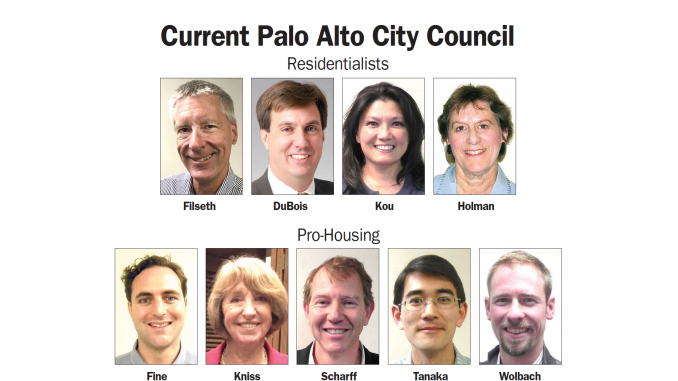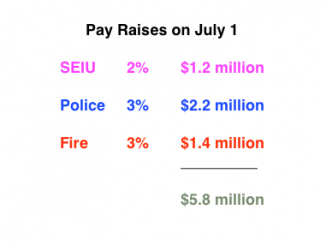
BY ALLISON LEVITSKY
Daily Post Staff Writer
Hoping to wait for a new Palo Alto City Council in January, three Residentialist council members tried to thwart a controversial discussion on housing development last night (Nov. 26) — and while they failed, the vote is far from over.
Council wrapped up the meeting around 11:50 p.m. after listening to dozens of public commenters, quibbling over process and questioning a transportation consultant about how he collected parking data.
The still-pending proposal seeks to encourage housing development by relaxing restrictions on density, parking and building heights.
It would exempt 100% affordable housing developments from the ground-floor retail preservation ordinance, allowing those developers to more easily secure financing.
Ordinance to ease construction of new homes
Supporters say the proposal would ease the process of building needed apartments in Palo Alto, hopefully bringing prices down by adding supply, while opponents say it would worsen traffic and parking issues and cater to high-end developers without promising any affordable housing.
Council members Lydia Kou, Karen Holman and Tom DuBois unsuccessfully sought to delay the vote until next year, after the council is reduced from nine members to seven, and Councilman Cory Wolbach is replaced with Councilwoman-elect Alison Cormack.
Kou said that discussing the proposal last night would “breed further mistrust from the public” and that an unnamed downtown developer whose project had deadlines in December and would be affected by a delay in the ordinance’s approval.
Vice Mayor Eric Filseth, who frequently votes with Residentialists Kou, Holman and DuBois, opposed the motion to delay.
“Next year’s council is going to be pretty close to the current council. There’s not going to be huge changes,” Filseth said.
‘Delay, delay, delay’
Councilman Adrian Fine, who criticized the attempt at “obstructionism” in a text message to the Post, said at the meeting that there was “no backdoor stuff happening in this” and that he saw it as “exceptionally important for us not to delay, delay, delay.”
The proposal proved as divisive as any in Palo Alto, touching on most of the city’s most contentious issues.
Longtime council observer Bob Moss said he was “impressed” by the proposal, and not in a good way.
“This proposal impresses me because it’s one of the worst I’ve ever seen,” Moss said. “Why do we want to increase the (building) height next to single-family homes? Terrible proposals.”
Others, particularly housing advocates, urged the council to accept the proposal.
Deb Goldeen said the city had been “criminally negligent” in meeting its housing needs and recalled seeing double-parked cars at a rest stop on the way back from Oregon and realizing that people were sleeping in their cars to get to work in the Bay Area.
“I am incensed that we obsess over trivialities when the level of suffering that is being inflicted on people who need to work, but can’t afford to live anywhere near it, is not really being considered,” Goldeen said.




>increase the (building) height next to single-family homes?
Add to that the elimination/sharply lower parking requirements for those taller structures. And what you arrive it will tell you how much those advocating for these proposals are beholden to the developers and those that profit from these decisions.
What you have is the destruction of the very quality of life that brought people to the Bay Area. The developers would move on to greener pastures post-destruction, as would the jobs, and it would be impossible to hold accountable those Council members that voted in favor.
If the residentialists can compel Council to not give in…until the next recession hits…they would be proven right. Remember 2000-2004, 2007-2010, and earlier downturns in the local markets. This boom is an anomaly and a correction is long due.
“hopefully bringing prices down by adding supply…” the hopefully says it all. Council cannot force developers to build truly affordable housing, like for teachers or public service workers or medical staff. And developers are not known for leaving money on the table – they will build as much market rate housing as possible. The overall small number of units to be added to the supply side will have no impact on the scale with demand.
We have a difficult problem but changing zoning laws that will impact all of us for decades without really understanding the costs in terms of traffic, pollution, parking, demand for municipal services, etc. is foolhardy. Of course, the “fools” who will vote for this ordinance will be long gone when we suffer the worst impacts.
People like Traffic Warrior got us into this fix. Rents have been going down in the Bay Area over the past few months as new units hit the market. If you’re against capitalism, you’ll never understand that the law of supply and demand works.